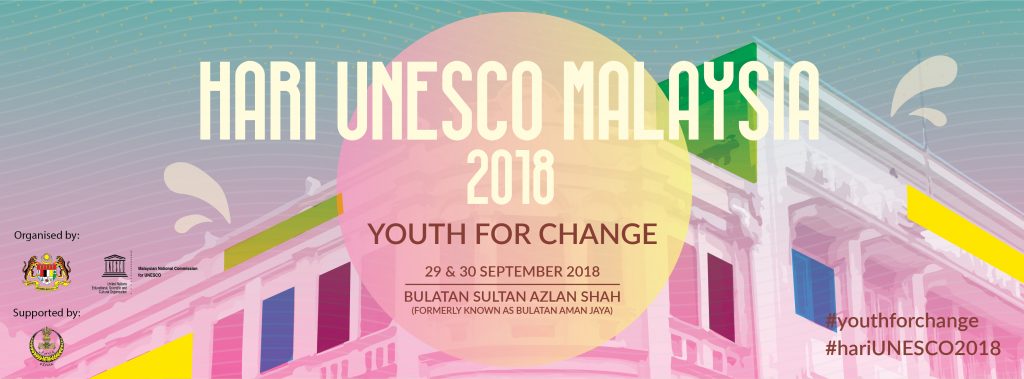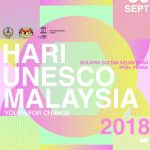
HARI UNESCO MALAYSIA 2018
Date : 29-30 September 2018
Venue : Bulatan Sultan Azlan Shah, Ipoh Perak
A CARNIVAL-like atmosphere greeted visitors to the launch of the national UNESCO Day celebrations at Sultan Azlan Shah’s roundabout in Ipoh, Perak.
The event was launched by Education Minister YB Dr. Maszlee Malik featuring exhibitions, cultural and musical performances as well as talks.
In his speech, Dr Maszlee said he believed that Perak was chosen as the launch venue for this year because of its popularity on the world map.
He said the celebration was timely in view of the state’s recognition by Lonely Planet and UNECSO’S acknowledgment of the Archaeological Heritage of Lenggong Valley. Perak’s treasured heritage of balancing its old-world charm and modern-day hipster culture is an attribute that all Malaysian should be proud of. YB Dr. Maszlee also expressed his hope for the collaboration to further strengthen Perak’s tourism industry as well as protecting its heritage in a sustainable manner.
Also present were state executive councillor Dr. Abdul Aziz Bari and UNESCO’S Jakarta Office Director, Professor Dr.Shahbaz Khan.
The annual event was aimed at highlighting and sharing with the public the aspirations of UNESCO and its objective to advocate peace and security in the world as well as protecting the environment and cultural heritage.
Most importantly, UNESCO Day in Malaysia is held to showcase the role the country plays in supporting UNESCO’S aspirations and visions in its sustainable development goals (SDG).
This year’s theme which is ‘Youth for Change’, is timely in this fast-changing globalised world. One of the key contributors to sustainable development is population growth whereby the SDG has put youth central in the development agenda to ensure social and economic well-being, cultural and environmental preservation and protection.
During the event, two manuscripts – Hikayat Panji and Kitab Ilmu Bedil – were recognised by UNESCO. On the award, YB Dr. Maszlee said cultural heritage was made up of many things large and small, preserved through books, artefacts, objects, pictures, photographs, art and oral tradition.
As such, the UNESCO’S Memory of the World Programme is a legacy of the past to the world community of the present and future. To date, 5 documents were inscribed and received recognition by UNESCO. The latest being Hikayat Panji which are tales from the 13th century, telling the many adventures of Prince Panji. Following that, Kitab Ilmu Bedil is another traditional literary genre written in the mid-19th century containing the precious traditional knowledge on weaponry.






